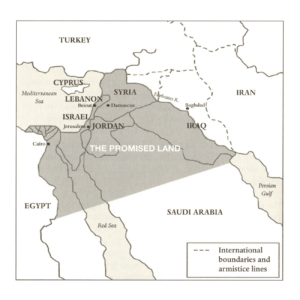For almost one hundred years now, the focal point for so much international chaos has been the Middle East. And one of the underlying hubs that ties together many disparate events there has been the existence of and various relationships with the modern state of Israel. The land that it occupies has been actively contested for millennia and still very much occupies the minds and motivations of millions. So it is no surprise that the subject of so much conflict and debate often centers around one primary question: whose land is it?
For Zionists worldwide, the answer is clear. It is often claimed that Jews, above all else, have a “right of return” to the land. Menachem Begin, former prime minister of Israel and founder of the Likud party famously stated that “We were granted the right to exist by the God of our fathers at the glimmer of the dawn of human civilization”. And in article ten of the Proclamation of The Third International Christian Zionist Congress, they affirmed:
“According to God’s distribution of nations, the land of Israel has been given to the Jewish people by God as an everlasting possession by an eternal covenant. The Jewish people have the absolute right to possess and dwell in the land, including Judea, Samaria, Gaza and the Golan.”
Unfortunately, all too often in these discussions the validity of statements like these are unquestioned, indeed, unquestionable and those on all sides of the issue commonly parrot the sentiments without any real reasoning or evidence behind them.
In actuality, these claims do not accurately reflect the history of God’s plan and purpose for the Jews or the nature of their covenant.
What Land, Exactly?
Inherent in the claim that Israel belongs to the Jews is an implication of what land “Israel” actually occupies in the historical context. So the first task is to actually identify the borders of that land. The history of the Jewish people and their promised land begins with Abraham and his covenant with God in Genesis 15:
“To your descendants I give this land, from the river of Egypt [the Nile, presumably] to the great river, the Euphrates”
Genesis 15:18
Effectively, this shows the original borders including a swath of eastern Egypt, the Sinai Peninsula, up the Mediterranean coast to the southern border of Turkey, and down the Euphrates, through Baghdad, to the Persian Gulf, along the way encompassing almost all of modern day Syria, Jordan, and the northern third of Saudi Arabia.

As is very evident, modern day Israel includes hardly any of this land and it certainly seems almost impossible that it ever could. Consequently, one of the important claims of Dispensationalists like Scofield is that Israel has never actually taken the land, never possessed the fullness of the covenant. As is characteristic of Dispensationalist thought, a literalism is projected onto the text that, though often welcome, must always be contrasted with the context and intent communicated by scripture itself, not brought to the text by the reader.
The difficulty with this claim is that the Bible already gives us reasons to believe that the promise was fulfilled. For instance, Joshua 11:23 says, “So Joshua took the entire land, just as the Lord had directed Moses.” As well, in Joshua 21:43, 45, the writer declares, “Thus the Lord gave to Israel all the land that he swore to give to their fathers. And they took possession of it, and they settled there. Not one word of all the good promises that the Lord had made to the house of Israel had failed; all came to pass.” Subsequently, it can be noted that in Joshua 23 we find that, “the Lord your God himself…will drive [the nations] out before you, and you will take possession of their land, as the Lord your God promised you.”
And that is not to mention other passages in I Kings, II Samuel, and Nehemiah that give other clues and evidence that the promised land was successfully taken in confirmation of the Abrahamic covenant. Nehemiah 9:7-9 recounts God’s promise and fulfillment to deliver the lands of various tribes located within the promised land. And in II Samuel 8:3, “David also defeated Hadadezer the son of Rehob, king of Zobah, as he went to restore his power at the river Euphrates,” indicating that, at one point or another, the kingdom did, indeed reach to the Euphrates river. While one could possibly claim that these passages contain contradictions, it is certainly not feasible to claim that the consistent, literal interpretation, even from passages from Joshua alone, testify that some covenant promises remain unfulfilled for Abraham’s descendants regarding their reception of the promised land.
Finally, though the Biblical borders set in Genesis 15 are clear, they were never entirely homogenous. We find in scripture at least two exceptions to this rule. In Deuteronomy 2:1-5, the author mentions a detour that Israel had to make around the hill country of Seir (a region of the Negev), recounting that they were told “do not provoke them to war, for I will not give you any of their land…I have given Esau the hill country of Seir as his own.” Further on, Israel is also told to avoid the Moabites and the Ammonites (present day Jordan) and not to provoke them to war and that they have not been given any part of their land. Additionally, there are instances of King Solomon trading cities in the region of Galilee to foreign powers, to non-Jews. All of this not only indicates the lack of modern day precedent for Jewish/Israeli ownership of these lands but also contrasts with the aggressive, militant nature that is present in modern day Israeli history in the 20th and 21st centuries.
What Terms, Exactly?
So with the promise and borders defined, and the actual inhabitation of those borders having been fulfilled at some point in the past, one tenet of the ongoing belief that Israel belongs to the Jews remains, that of their possession being one of an “everlasting covenant.” This language mostly stems from Genesis 17:8,
“And I will give to you and to your offspring after you the land of your sojournings, all the land of Canaan, for an everlasting possession, and I will be their God.”
Genesis 17:8
To many, at first glance, this appears to simply state, unequivocally that Israel will possess the promised land in perpetuity, and once again, this reading tracks very closely with the Dispensationalist hermeneutic of a straightforward, literal reading of the text.
However, as in other similar situations, the straightforward reading of one otherwise straightforward passage, taken along with other passages of scripture, does not provide such a straightforward conclusion. Take, for instance, Leviticus 25:23, which stipulates that, “the land shall not be sold in perpetuity, for the land is mine. For you are strangers and sojourners with me.” This resonates with other passages, like those in Jeremiah 2, and shows that, in the words of Stephen Sizer, “The land is never at the disposal of Israel for its own purposes. Instead it is Israel who is at God’s disposal.”
Ultimately, the nature of the promises given to Abraham and his descendants and the relationship of Israel and the promised land is that of a covenant. And as with all of God’s covenants, they consist of blessings for obedience and curses for disobedience. Above, Genesis 17:8 clearly details the blessings of the covenant but Genesis 17:9 goes on to detail Israel’s conditions for obedience:
“As for you, you must keep my covenant, you and your descendants after you for the generations to come.”
Genesis 17:9
As well, Deuteronomy 19:8-10 tells us, “And if the Lord your God enlarges your territory, as he has sworn to your fathers, and gives you all the land that he promised to give to your fathers— provided you are careful to keep all this commandment, which I command you today, by loving the Lord your God and by walking ever in his ways—then you shall add three other cities to these three, lest innocent blood be shed in your land that the Lord your God is giving you for an inheritance, and so the guilt of bloodshed be upon you.”
These passages, along with others, detail the agreed upon terms and conditions that Israel was required to follow in order to experience the blessings promised to Abraham and his descendants. If one thing is made abundantly clear throughout the Old and New Testaments, it is that Israel continuously failed to meet their end of that covenant. And given the history, demographic makeup, and past and present actions of the state of Israel, we can also clearly see that there does not exist a people upholding the terms of that covenant today either.
Therefore, since no nation of Israel has ever managed to uphold their commitments as part of the covenant, there is no reason to believe that the blessings of that covenant are still in effect.
If we take these facts along with a proper, non-Dispensational understanding of the nature of Israel in the new covenant era of Christ, it becomes obvious that there is no reason to believe, Biblical or otherwise, that the Jewish people are in any way entitled to any area of the promised land. We should not feel afraid to challenge vague, unsubstantiated statements regarding eternal Jewish ownership for Israel. God’s plan and purpose for His people now concerns His kingdom above all else, not a small strip of land in the Middle East.


Hi! I find your articles very thoughtful and interesting to read. I have been a Christian a long time and grown up in the culture that saw Israel becoming a nation again as a prophecy. As an adult, I have become thoroughly aware of how corrupt men in power are and will manipulate scripture for their own aims, however, I am interested in your response to this: Is it not possible to differentiate between the manipulation of people claiming “God is on their side” and doing horrible things to each other using God as an excuse versus seeing that Israel becoming a nation again and against apparent odds is in line with Biblical prophecy?
Hey Laura! Thanks for engaging. There are a lot of factors to your question which I’m sure you’re aware of. I’d say the main distinction that I would want to draw is that there are definitely separate and independent questions at play when Christians regard the question of Israel. With this article, I definitely intended to cover the idea and claims that land in Palestine somehow belongs to the Jews. But separate to that is whether the nation of Israel becoming a nation was a matter or fulfillment of prophecy. You could definitely argue for either independently.
Absolutely God can use evil or misguided people to otherwise accomplish His purposes. And if indeed the state of Israel represents a fulfillment of prophecy, He undoubtedly did just that. Of course, I don’t actually believe that to be the case. The expectation of Israel being “redeemed” and made a people again somewhat hinges upon the need for redemption and that need stems primarily from Dispensational theology. Without the Dispensational view of Israel the need for such fulfillment is unnecessary, though still not ruled out.
I’m actually excited to do a partner post to this one dealing with Israel’s rebirth in 1948 and claimed Bible prophecy. Is that a topic you’d be interested in seeing more about? Any other aspects of the issue you’d like to see addressed as well?